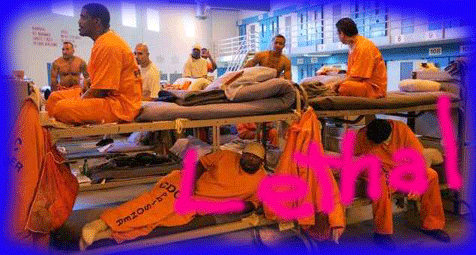
In 2002, a very angry U.S. District Judge Thelton Henderson ruled that health care in the California prison system violated the 8th amendment to the Constitution barring cruel and unusual punishment, and ordered the state to immediately make various improvements or face the possibility of federal receivership.
When Henderson examined the system again in 2005, he found that things were, if anything worse. One inmate “needlessly dies every six to seven days due to constitutional deficiencies in the CDCR’s medical delivery system,” wrote the judge.
Thus in April of 2006, Henderson appointed federal receiver Robert Sillen to take over the system. Yesterday, Sillen released his first comprehensive report on the condition of medical care in the state’s 32 prisons.
The news is still bad.
Sillen’s analysis found that of 426 deaths that year, 66 of them — or 15 percent — were “preventable”….or “possibly preventable.” Among even the non-preventable medical deaths (315),” Sillen writes, “more than half reflected lapses in care that may have contributed to earlier death or more suffering among terminal patients.”
The report is filled with specific horror stories of symptoms disregarded or ignored. Here, for example, is what the LA Times found in the report:
One inmate, who reported extreme chest pains in the middle of the night, died of a heart ailment after waiting eight hours to see a doctor.
Another who complained for days of severe abdominal pain died of acute pancreatitis after medical staff did not believe his pleas were credible.A third died after a two-year delay in diagnosis of his testicular cancer.
And an asthma patient died after failing to receive steroid medication for two days following transfer from a county jail.
According to the Sacramento Bee, Sillen believes it will take ten years to fix the badly broken system.
More reports and documents are expected before the September 24, 2007 court hearing at which time a three judge panel will take another step closer to putting the entire prison system under federal control, as the panels considers short-term fixes, like early prisoner release, in order to relieve the gross overcrowding of facilities that have consistently failed to meet constitutional standards in a multiplicity of ways.
It would be nice if we had a governor and state legislature capable of addressing a few of these problems themselves. But that doesn’t appear to be the case.

Your examples look similar to what happens under socialized medicine.
I don’t know if Sillen is qualified to determine that fifteen percent of deaths were preventable (or possibly), but I’d like to know how that compares to the treatments received at King/Drew Hospital.
It’s funny that the problem is government, but people look to more government to solve the problem.
Do you really expect the prison Medical system to be better than the lines at the DMV?
Do you really expect the prison Medical system to be better than the lines at the DMV?
Just wait until I see next time at the DMV!
I clicked over thinking to myself that reading the comments would be horrifying but I’m pleasently surprised. Nothing at all about prisoners not deserving medical care, only conservative plattitudes about the incompetence of government. I’m good with that. Thanks guys for not depressing me today!
Mavis, I can’t let you go away happy, so maybe we just want to keep the prisoners alive so that they can later take their places in the slow burning electric chair. Not saying that’s so, just maybe.
Civil Servent
That’s why I go to the Autoclub who handle nearly all DMV related tasks.